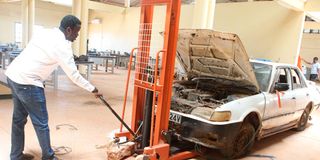Mandera TTI: An oasis of training in arid North

Mandera Technical Training Institute principal Jabir Abdirahaman in one of the workshops on September 27. Some of the machines purchased from China are lying due to lack of qualified instructors.
Mandera Technical Training Institute is an oasis of knowledge in Mandera County that lies under-utilised, with the managers having to work extra harder to boost enrollment, fight negative local perceptions towards technical training and get qualified trainers.
Started in 2016 with a population of 50 students, the technical training institute gives hope to thousands of school leavers from the region who fail to make the university grade.
It is located about eight kilometres on the outskirts of the town and now has an enrollment of 700 students, 300 of whom joined during the September intake.
The first batch of students was sponsored by the county government to attract more youth into the facility. Mr Jabir Ahmed Abdirahaman, the principal, told Higher Education that the institute has at least 250 students on internship within and outside Mandera County.
“We have rapidly grown despite challenges such as limited accommodation facilities and lack of enough trainers,” he said.
The institute has seven trainers in the government payroll and 13 others hired by the board of management. Popular courses at the institute include electrical and electronic engineering, mechanical engineering, Information and Communication Technology (ICT) and business Studies.
“We are offering both certificate and diploma courses which include human resource management, accounting and supply chain management, among others,” Mr Abdirahaman said.
He pointed out poor fees payment as the main challenge in running the facility.
“The fees per year is about Sh74,000 whereby the national government pays at least Sh30,000 capitation fees and the rest has to be paid by the student, but still they cannot afford to pay,” he revealed.
According to Mr Abdirahaman, lack of interest in education by parents and students contributes to the poor payment of fees.
“Our society has not embraced the importance of this facility. We accept whatever a student who wants to study comes up with because we are willing to equip them for their future. Some walk in here with only Sh2,000 and we are left with no option but to admit them hoping both levels of government would step in and help,” he said.
He said public awareness on the importance of the technical institute needs to be done for the residents to appreciate the courses offered.
“All our children want to be medical officers, lawyers while others drop out of school to become businessmen. They want courses with better pay unlike what is being offered at this institute,” said Mr Rashid Hassan said.
To attract more applications, the TTI had to inform residents that the national government would pay Sh30,000 capitation tuition fees for every student who applied through the Kenya Universities and Colleges Central Placement Services.Students are also eligible to receive at least Sh40,000 loan from the Higher Education Loans Board, in addition to bursaries from the county government and the Constituency Development Fund.
“There is no reason whatsoever for school leavers not to enrol at Mandera Technical Training Institute due to lack of school fees,” reads the advertising poster.
The facility is struggling to get a qualified instructor in the Mechanical Engineering Department as none of the current staff can operate the machines.
“We have machines used in making spare parts for vehicles but we have been unable to get a trainer because it will cost us Sh80,000 per month to retain just one,” Mr Abdirahman said.
The machines lying idle at the facility were sourced from China by the Mandera county government in 2019 at a cost of Sh200 million.
Mr Abdirahman proposes sending one of the trainers from the facility to China to be trained on how to operate the machines before students get introduced to the new technology of manufacturing car spare parts.
All the students are accommodated at the institute, piling pressure on management over limited facilities. It lacks a permanent water source and has to rely on daily supplies by local dealers, costing Sh4,000 per bowser.
The institute is among those earmarked by the national government to be elevated to a national polytechnic and its management is optimistic that this will improve both the intake, facilities and services it offers.





